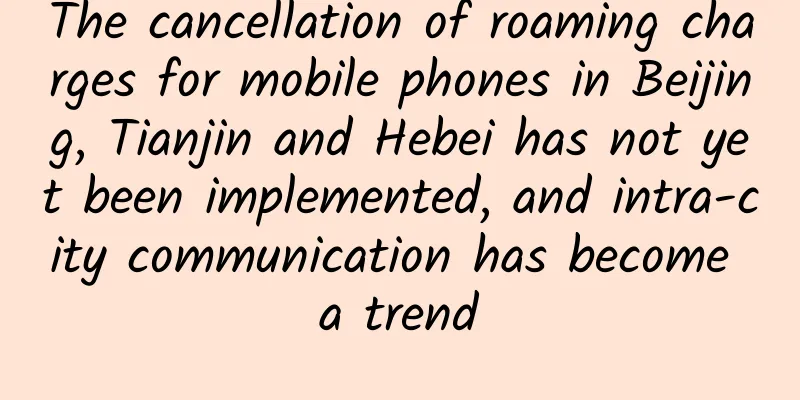|
After five years of difficulties, the Beijing-Tianjin-Hebei "communication integration" project has finally made some progress.
On July 27, the news that "Beijing-Tianjin-Hebei region will cancel roaming fees" was reported and forwarded by a large number of media outlets. The news pointed out that the Beijing-Tianjin-Hebei region will officially cancel long-distance roaming fees on August 1 this year. At present, the three major operators and the Ministry of Industry and Information Technology have not issued an official response to this, and the news cannot be confirmed. However, a person from China Mobile Group said, "The news is basically true and has been discussed for a long time."
After the integration of Beijing, Tianjin and Hebei was elevated to a national strategy, the two cities signed the "Agreement on Key Work for Implementing the Major National Strategy of Coordinated Development of Beijing, Tianjin and Hebei", which listed the integration of telecommunications services as one of the work requirements for the integration of public services, and clearly put forward the goal of "no long-distance calls for fixed lines and no roaming for mobile lines".
However, it should be pointed out that "no long-distance calls for fixed-line phones" is difficult to achieve for the time being. The rate adjustment in the Beijing-Tianjin-Hebei region only applies to mobile phone voice services, and long-distance calls for fixed-line phones and mobile data services are not included in the adjustment. According to the data from the Communications Administration, there are 117 million mobile phone users and 22.34 million fixed-line phone users in the Beijing-Tianjin-Hebei region, and the latter are not included in this rate adjustment.
Policy difficulties
Long before the country promoted the integration of Beijing, Tianjin and Hebei, the demand and work for communication integration had been carried out for several years, but there was no progress.
As early as 2010, the Hebei Provincial Government issued two policies, "Opinions on Accelerating the Industrial Development of Hebei Province's Capital Economic Circle" and "Decomposition of Seven Key Battle Tasks in the Capital Economic Circle". The policies clearly issued "communications in the same city" requirements to the Hebei Provincial Communications Administration, including two tasks: fixed telephones in the 13 counties around the capital use the "010" area code, and mobile phones do not roam with Beijing. In addition, the policy requires "one year to create an image, two years to lay the foundation, and three years to achieve results".
However, to this day, intra-city communication has been difficult to implement. In the 13 cities and counties surrounding Beijing, operators do not accept individual users' applications for 010 telephone services. Only Sanhe City allows companies to apply for 010 telephones, and all fixed-line services have not cancelled long-distance charges.
On July 2, 2014, the Consumer Associations of Beijing, Tianjin and Hebei sent a public letter to the National Development and Reform Commission, the Ministry of Industry and Information Technology and the three major operators, publicly suggesting "canceling long-distance and roaming communication charges in the Beijing-Tianjin-Hebei region."
The Consumers Associations of the three regions found in their survey that it is common for the Beijing-Tianjin-Hebei region to charge inter-provincial long-distance charges and roaming charges, and in Hebei Province, cities at all levels also charge "two charges" for long-distance calls. Previously, a China Mobile user living in the suburbs of Beijing told reporters, "When I make a phone call at home, I walk from the living room to the bedroom, and the call becomes a roaming call, and roaming charges are incurred." The user has complained several times about this, but to no avail.
Consumer associations in the three regions said that in the process of Beijing-Tianjin-Hebei integration, the mobility and communication of enterprises and personnel have led to an increasing number of people working and living across the three regions. The demand for calls between the three regions has increased significantly, and long-distance and roaming charges have already had a certain impact on the integration process of the three regions.
After the Consumer Association intervened, Beijing Telecom took the lead in announcing that it would launch a special tariff for Beijing, Tianjin and Hebei, mainly targeting the user groups in the three regions, with more favorable roaming tariffs. Later, Beijing Telecom launched the "Beijing-Tianjin-Hebei Free Travel Package" with a monthly fee of 2 yuan. After opening this service, the call fee for mobile phone users in Beijing, Tianjin and Hebei is unified at 0.11 yuan per minute, and the call is free.
At the same time, China Unicom also stated that it has been implementing one-way charging for mobile phones, reducing roaming charges, reducing fixed-line service charges, long-distance call charges, etc., and plans to adopt local preferential rates in the context of promoting local economic development and cooperating with the implementation of the economic integration strategy.
However, the "urban communications" in Beijing, Tianjin and Hebei has not yet been implemented.
Intra-city integration becomes a trend
While the Beijing-Tianjin-Hebei region is hesitating on the issue of "cancelling roaming charges", the Guangxi region is celebrating the "intra-city communications".
Recently, the Guangxi Autonomous Region introduced at a working meeting on "Beibu Gulf Economic Zone Integration": "The five urban areas in the Beibu Gulf Economic Zone have completely abolished mobile phone roaming charges and long-distance charges, as well as fixed-line long-distance charges." In addition to Guangxi, provinces such as Shanxi, Fujian, Guizhou, Jiangxi, Hunan, Liaoning, Henan, and Guangdong have also implemented communication integration in many cities within the province, and completely abolished fixed-line, mobile long-distance, and roaming charges in the region.
The transformation of communication within the same city is regarded by all provinces as one of the foundations of economic reform. However, this reform has added a great burden to the operators. According to reports, in the Changsha-Zhuzhou-Xiangtan communication within the same city project, the three operators had an average of nearly 2,000 people working day and night on the front line, and more than 3,500 people at most. Each communication enterprise completed the testing of more than 25,000 projects on average, with the number of tests reaching 100,000 times. The transformation of communication within the same city was extremely difficult and required huge investment.
In addition, the cancellation of roaming charges has also reduced operators' revenue. In Guangxi Autonomous Region, the three major operators lost nearly 400 million yuan in revenue in one year due to the cancellation of roaming charges. Correspondingly, telecom customers in the region reduced their phone bills by 10%.
In fact, Chinese operators have always lagged behind in roaming fee reform. The United States had already gradually abolished domestic roaming fees between 2007 and 2008, and even T-Mobile promised its users to cancel international roaming fees; the European Union has clearly required that roaming fees within the EU be abolished in 2017. Even before this, the Indian government has publicly promised to cancel roaming fees.
In recent years, the country's series of measures for telecommunications reform have emphasized "speeding up and reducing fees" in the hope of reducing costs for businesses and users and promoting entrepreneurship and economic development. It is for this reason that intra-city communications have become a policy that is being promoted in provinces across the country.
Of course, in addition to the telecommunications industry, transportation, finance, and medical care are also promoting the "urbanization" reform. In the Beijing-Tianjin-Hebei region, integrated plans for transportation, medical care, and banking have been released, including the "Beijing-Tianjin-Hebei One Card" transportation pilot and the "Beijing-Tianjin-Hebei Collaborative Card" business launched by Huaxia Bank.
In the process of promoting reform in the Guangxi Economic Zone, the reform of education, household registration and social security in the same city has achieved initial results. The Guangxi Autonomous Region Government believes that "without breaking down the barriers of the system and mechanism and the restrictions of administrative divisions, there will be no competitiveness and it will be difficult to achieve the strategic positioning tasks assigned by the state."
As a winner of Toutiao's Qingyun Plan and Baijiahao's Bai+ Plan, the 2019 Baidu Digital Author of the Year, the Baijiahao's Most Popular Author in the Technology Field, the 2019 Sogou Technology and Culture Author, and the 2021 Baijiahao Quarterly Influential Creator, he has won many awards, including the 2013 Sohu Best Industry Media Person, the 2015 China New Media Entrepreneurship Competition Beijing Third Place, the 2015 Guangmang Experience Award, the 2015 China New Media Entrepreneurship Competition Finals Third Place, and the 2018 Baidu Dynamic Annual Powerful Celebrity. |










